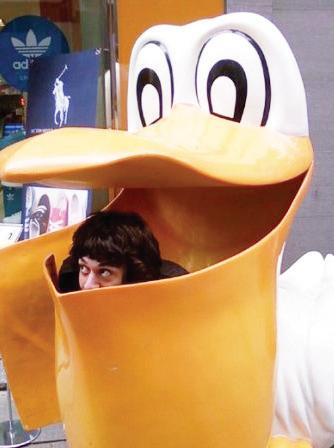‘Hangeul’ is not an international language but these days many foreigners come to Korea to learn it. What prompts them to learn Korean? The Sookmyung Times (SMT) met students from Italy and the U.S.A. to find out.
Alberio Lossana (ALBERIO)
lyussyalbe@ymail.com
I’m Italian. I have been to China and Japan before, and I finally come here to Seoul. After 1 year here I believe that I will not move back to Italy soon!
Cameron Wilson (CAMERON)
Dirigent7@gmail.com
I’m from San Francisco, California and my total time in Korea is 1 year. I’m here to study Korean, make friends, and eat good food.
 PHOTOS FROM ALBERIO
PHOTOS FROM ALBERIO
SMT Why do you want to learn Korean? Is there any special reason?
ALBERIO It is not that special reason but the reason why I want to learn Korean is that during my trip in Japan and China, all of my friends were Korean. I started to think, ‘Okay I met Korean friends and why don’t I go to Korea to learn the Korean?’ Also I was interested in Korean because all my friends were funny and interesting people. So I came to Korea and started to learn Korean.
CAMERON I studied abroad at Yonsei University for 1 year and enjoyed the structure and culture of Seoul. The people were friendly and the transportation system allowed me to move around easily. I want to study Korean further to gain a deeper understanding of the culture. I also enjoy the challenge of learning another language and Korean is quite hard, so it’s fun.
 SMT What was the hardest thing or exciting thing in studying Korean?
SMT What was the hardest thing or exciting thing in studying Korean?
ALBERIO The hardest thing in studying Korean is the language Korean itself. I mean pronunciation and grammar of Korean are very hard to learn for foreigners. Especially pronunciation of ‘ㄷ, ㄸ, ㅌ’ was very hard. I couldn’t find the difference when I first heard the pronunciation of consonants. To me, it sounds like all the same thing.
CAMERON The most difficult thing is understanding people on the street or at restaurants because they speak quietly and use vocabulary I don’t know, but this hasn’t been a huge problem because they are usually kind enough to slow down if I ask.

ALBERIO I had studied Korean before I came to this school so I could exchange simple questions and answers with people and a professor said I had a knack for Korean and my speaking is perfect. Therefore he suggested I go on a TV show. At first I refused it, but he continuously asked me to go on a TV show so I accepted it. When I arrived at the broadcasting station and said hello in Korean to them, they looked very surprised. It was very funny thing that I experienced.
SMT What do you think about the studying style in Korea? Are there any differences between Korea and your country?
ALBERIO I think the studying style of Korea can be helpful in math, chemistry, like this kind of stuff but not in learning language. For example, one of my Korean friends can read very difficult books and she understands everything but she can’t read it out loud. Also when I study Korean at SMU at first I had to learn only grammar and words. I could learn speaking when I attained a high level.
CAMERON I have heard that many Koreans classes don’t have students participate. A lot of participation is encouraged in the U.S. because it lets the teacher know if the students are learning or not. I prefer this style of participation. The teacher at Lingua Express asks that we participate frequently and I believe this helps me improve my Korean ability.
SMT Have you ever used Korean in Korea? Not in class but
outside like at a shopping mall or something. 
ALBERIO I used to be just speaking Korean. During my part time job all my co-workers are Korean so I also used Korean. Everybody was surprised at this but I’m in Korea. Why should I speak English? If I want to use English I had to go to the United States. So I usually speak Korean during the time I stay in Korea.
CAMERON Yes I have. I exercise at a studio in Itaewon. The owner and master is Korean. We often have conversations regarding techniques or UFC fights. Sometimes it is difficult to have conversations because my Korean is not good enough to describe body movement accurately. So during conversation we use Korean, English, and body movements.


